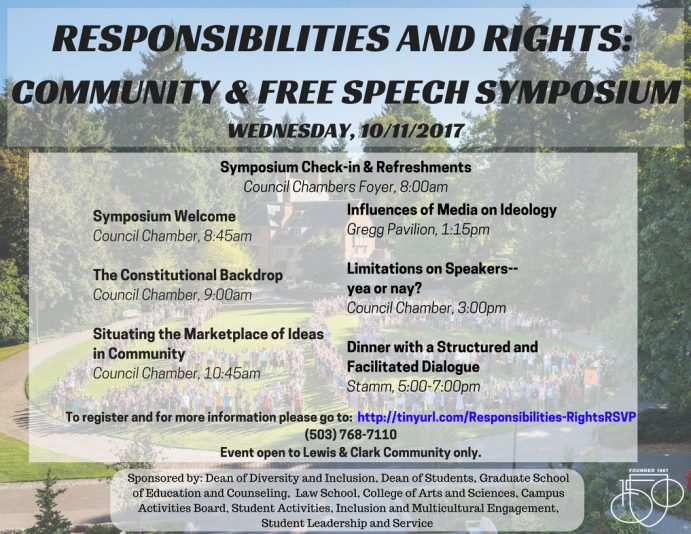Responsibilities and Rights: Community and Free Speech

How does “free speech” operate on a private, liberal arts campus? Where are the legal boundaries? How do we make sense of the impact of speech on others, especially in relation to power, equity, and privilege? Where are the tensions between speech and community?
This symposium seeks to explore these questions and more as we situate them in the context of Lewis & Clark College. Join us for a day of discussion and dialogue with students, staff, and faculty from the College of Arts and Sciences, Graduate School of Education and Counseling, Law School, and Common Services.
Event open to Lewis & Clark community only.
To attend, one must register at the following link:
http://tinyurl.com/Responsibilities-RightsRSVP

Wednesday, 10/11/2017
Program
Symposium Check-in and Refreshments
Council Chamber Foyer Area
8:00 am
****
Symposium Welcome
Council Chamber
8:45 am
Wim Wiewel, President
Anna Gonzalez, Dean of Students
Janet Steverson, Dean of Diversity and Inclusion
****
The Constitutional Backdrop
Council Chamber
9:00 am
When Americans discuss the issue of free speech, they frequently include references to the First Amendment of the U.S. Constitution. That amendment explicitly protects “the freedom of speech,” and the Fourteenth Amendment has been interpreted to include a similar protection. But because those two constitutional amendments only provide rights against government actors, they do not necessarily provide the controlling rule in many contexts where people might assume they have a right to free speech. One such context is the campus of a private college like Lewis & Clark.This session will include explanations of (1) what actions by the college, or government regulators of the college, would and would not implicate the constitutionally protected free speech rights of students, faculty, and staff, (2) what additional constitutional protections students, faculty, and staff at public colleges and universities have against actions taken by school administrators, (3) how the Oregon Constitution’s protection of free speech compares to the protection in the U.S. Constitution, and (4) the key debates that have arisen when different countries have considered whether and how to provide constitutional protection of speech. Although the approach a private college takes to balancing free speech interests with other important interests is not dictated by domestic or international constitutional norms, those norms can certainly help inform the conversation as the appropriate balance is sought.
Bill Funk, Distinguished Professor of Law Emeritus
Jim Oleske, Associate Professor of Law
Ozan Varol, Associate Professor of Law
Moderator: Janet Steverson, Dean for Diversity and Inclusion
****
Break
10:35 am
****
Situating the Marketplace of Ideas in Community
Council Chamber
10:45 am
How do we set up spaces for idea exchange? Whose voices are heard? This panel will explore the historical contexts and contemporary realities of argument, information exchange, and community.
Margeaux Reed, College of Arts & Sciences
Maya Litauer Chan, College of Arts & Sciences
Stuart Kaplan, Professor Emeriti
Mark Figueroa, Associate Provost for Institutional Research & Planning and Graduate School of Education and Counseling Assistant Professor
Moderator: Angela Buck, Interim Director of Inclusion and Multicultural Engagement
****
Lunch Break (On Your Own)
12:15 pm
****
Influences of Media on Ideology
Gregg Pavillion
1:15 pm
With the advancement of technology, students receive their information from a variety of sources. The kind of news that students receive can influence their discussions both inside and outside the classroom. This session will explore the effects the media has on the Lewis & Clark academic and student life community.
Terrell Mwetta, College of Arts and Sciences
Patrick Varner, College of Arts and Sciences
Samantha Trunkett, Graduate School of Education and Counseling
Anrey Wang, Graduate School of Education and Counseling
Angela Hajihashemi, Lewis & Clark Law School
Corrine Fletcher, Lewis & Clark Law School
Moderator: Molly Robinson-Kelly, Associate Professor of French and Department Chair
****
Break
2:45 pm
****
Limitations on Speakers— yea or nay?
Council Chamber
3:00 pm
Should there be limits at Lewis & Clark on which speakers can come to campus and/or on what speakers can say on campus?
Reiko Hillyer, Assistant Professor of History
Steven Kanter, Professor of Law
Christopher Roberts, Adjunct Professor of Exploration and Discovery
Heather Smith-Cannoy, Associate Professor of International Affairs and Department Chair
Moderator: Mollie Galloway, Associate Professor and Chair of Educational Leadership
****
Break
4:30 pm
****
Dinner with a Structured and Facilitated Dialogue
Stamm
5:00 pm – 7:00 pm
After participants grab dinner, they will engage in a structured dialogue on the specific question of whether our democracy should protect hate speech. The deliberation process will include a reading comparing the U.S. with Germany. In small groups, with the assistance of a facilitator, participants will present pro/con position based on the reading. An open discussion will follow these presentations. In the discussion the participants will be encouraged to reflect on new information that they obtained from the symposium and to work toward a consensus in their group. At the close of the discussion all the groups will share their points of agreement and dissent. The deliberation process is designed to encourage an understanding of different viewpoints and participation in a civil dialogue rather than a debate.
Marilyn Cover, Executive Director, Classroom Law Project and Adjunct Law Professor
Vice President of Student Life and Dean of Students is located in East Hall on the Undergraduate Campus.
MSC: 102
email vpsl@lclark.edu
voice 503-768-7110
Vice President of Student Life and Dean of Students
Dr. Evette Castillo Clark
Vice President of Student Life and Dean of Students
Lewis & Clark
615 S. Palatine Hill Road MSC 102
Portland OR 97219